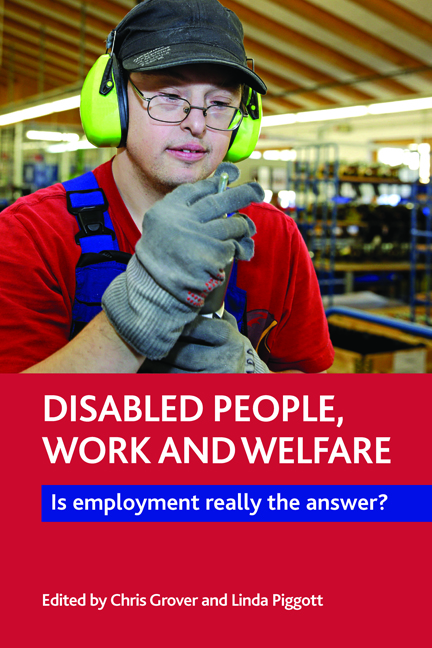Book contents
- Frontmatter
- Dedication
- Contents
- List of tables and figures
- List of abbreviations
- Notes on contributors
- Acknowledgements
- one Disabled people, work and welfare
- Part One Changing constructions of disability and welfare
- Part Two Social policy, work and disabled people
- Part Three Assistance and access to paid work
- Part Four Alternatives to, and validated lives beyond, paid work
- Part Five Conclusion
- Index
twelve - Thinking differently about ‘work’ and social inclusion for disabled people
Published online by Cambridge University Press: 11 March 2022
- Frontmatter
- Dedication
- Contents
- List of tables and figures
- List of abbreviations
- Notes on contributors
- Acknowledgements
- one Disabled people, work and welfare
- Part One Changing constructions of disability and welfare
- Part Two Social policy, work and disabled people
- Part Three Assistance and access to paid work
- Part Four Alternatives to, and validated lives beyond, paid work
- Part Five Conclusion
- Index
Summary
Introduction
Paid employment is the primary marker of social exclusion and inclusion in Western neoliberal states, including the two nations – Britain and Canada (Roulstone and Prideaux, 2012) – that we focus on in this chapter. Those not in receipt of income from work and reliant on welfare benefits, including disabled people, are being placed under increasing pressure to participate in state programmes of ‘reactivation’ to move from welfare into employment, as part of a broader transformation of the welfare state and government budget cuts (see, for example, Duncan Smith, 2014, in Britain). For some disabled people (in particular, those already in some form of work, or with higher skill levels and experience), there are new opportunities for access into and maintenance of employment. For many, however, gaining access to, and staying in, paid employment is extremely challenging.
There are numerous barriers to employment for disabled people, including:
• a lack of qualifications and experience;
• attitudes of employers;
• absence of adequate support from agencies;
• physical access to the workplace;
• a lack of appropriate job opportunities (Thornton, 2009; Crawford, 2012).
People can also face difficulties at work that include:
• the attitudes of fellow employees and supervisors;
• expectations in terms of behaviour and appearance;
• pay and conditions, including hours and flexibility (Roulstone et al, 2003; Wilton, 2004).
For these reasons, the proportion of disabled people in paid employment has plateaued at a level far below that for non-disabled people. Furthermore, as austerity measures tighten, many disabled people are finding themselves in a double bind. They are unable to secure a paid job and are denied adequate benefit payments to support themselves, with a resultant decline in wellbeing. Moreover, the rhetoric of welfare reform in both Britain and Canada is becoming increasingly sharp.
In Britain, popular and political discourses increasingly contrast those understood as ‘strivers’ (who take an active approach to gaining employment) with those seen as ‘skivers’ (in receipt of welfare benefits, and who make little effort to find work). The Canadian landscape is more uneven because social welfare is a provincial policy matter, but there too there has been a prevailing trend towards emphasising individual responsibility and (a lack of) motivation, while downplaying the ‘complex and deeply-rooted social and systemic inequalities’ that shape the employment prospects of disabled people (see Gewurtz et al, 2014, p 1; also Prince, 2012).
- Type
- Chapter
- Information
- Disabled People, Work and WelfareIs Employment Really the Answer?, pp. 219 - 238Publisher: Bristol University PressPrint publication year: 2015



